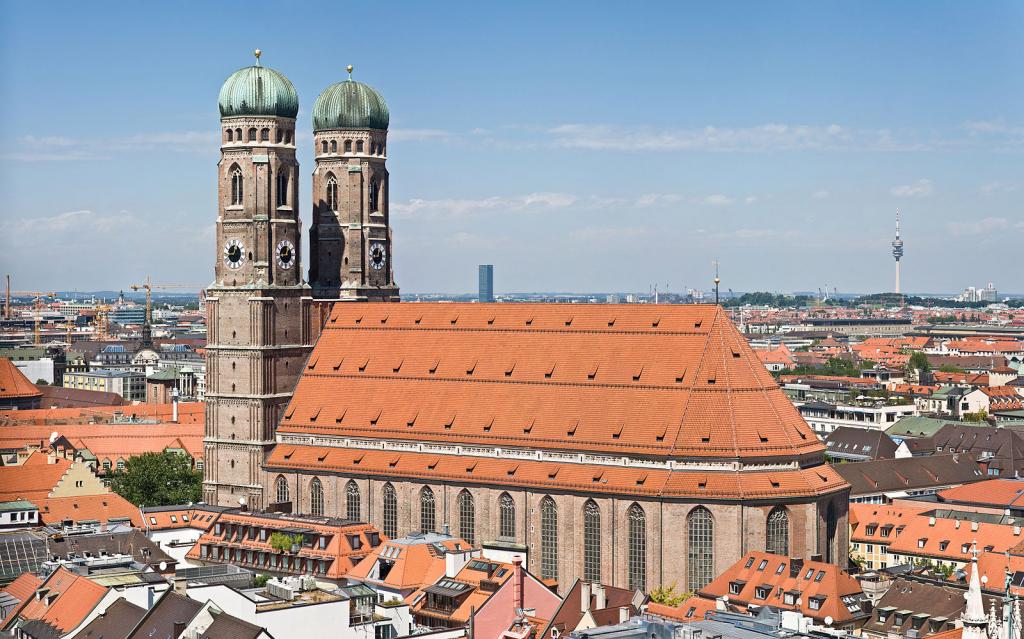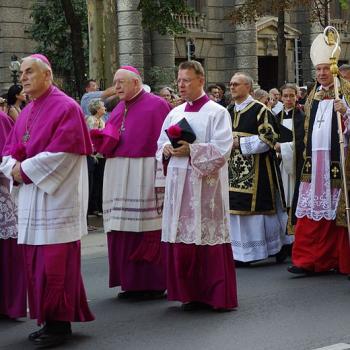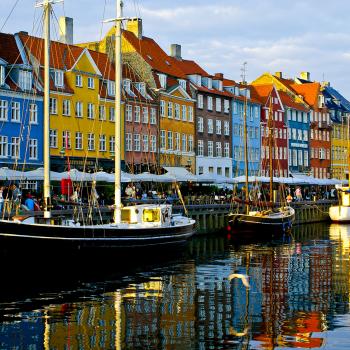
On October 31, 1517, Martin Luther famously nailed his 95 theses to the church door at Wittenberg.
On April 17 – 18, 1521, Luther appeared before the Diet of Worms and refused to recant. (See this Reformation timeline.)
On April 17, 2021, in commemoration of the 500th anniversary of the latter event (having missed the first 500th anniversary), the bishops of the German Catholic Church declared themselves to be independent of Rome, changing their doctrine and practices as they believed necessary to conform to German cultural norms and expectations, with the primary goal of meeting the spiritual needs of German church-tax-payers. They promised a revised catechism as soon as a working group completed its task and the full document was brought up for a vote by a conference of clerical and lay delegates, periodic gatherings of which would in the future determine any further changes. From Rome, Pope Francis welcomed the new ecclesial body as colleagues, expressing his hopes for greater synodality in the future, while a minority of churchgoers expressed bewilderment at the proclamation that the new church would authorize same-sex marriages and post-divorce remarriages, and would no longer consider non-marital relationships or contraceptive use to be a topic of any relevance to Catholic teachings on morality. (It was unclear what stand the new body would take on abortion or assisted suicide.)
OK, we don’t know whether that will actually happen. But if it did, it would be in in with what’s going on in Germany and Rome right now.
Here’s an English-speaking report, from the Catholic Herald, “German bishops announce ‘synodal process’ on celibacy, sexual morality,” as the German bishops were finishing up their bishop’s conference, at which observers were waiting for news on actions they would take in light of last summer’s report on past abuse cover-ups. And the announcement came from Cardinal Reinhard Marx of Munich and Freising. (Freising, incidentally, is a small town outside Munich, known now for being the site of its airport but once upon a time significant enough that the diocese was named after both. It’s annoying, though, that they never renamed the diocese.)
Cardinal Reinhard Marx of Munich and Freising has announced that the Catholic Church in Germany is embarking on a “binding synodal process” to tackle what he says are the three key issues arising from the clerical abuse crisis: priestly celibacy, the Church’s teaching on sexual morality, and a reduction of clerical power.
Speaking at the conclusion of the plenary session of the German bishops’ conference on Thursday, Marx told reporters that the bishops had unanimously decided these three topics would be subject to a process of “synodal progression” that could lead to a binding, but as yet undetermined, outcome.
“The Church needs synodal progress,” the president of the German bishops’ conference asserted. “Pope Francis encourages this.” . . .
Addressing journalists on the final day, Marx said the Church’s teaching on sexual morality has yet to account for significant recent discoveries from theology and the humanities. Also, he said, the significance of sexuality to personhood has not yet received sufficient attention from the Church.
Bishops “feel we often are unable to speak on questions of present-day sexual behavior,” Marx said.
The cardinal also said that the German bishops appreciate priestly celibacy as an “expression of the religious bond to God” and do not simply want to give up on it. But to what extent celibacy should always be an element of priestly witness is a question “we will determine” through the “synodal process,” Marx told the press.
Furthermore, Marx said clerical abuse of power constitutes a betrayal of the trust of people in need of stability and religious orientation. Therefore, the “synodal process” would be charged with identifying what measures must be taken to achieve “the necessary reduction of [clerical] power.”
So, with respect to the first two items, at least, this sounds like everything we’ve been told is not true about sexual abuse: there are so many abusers to be found among the ranks of married and those in relationships that it’s not about mandatory celibacy. And we are just as relentlessly told that child sexual abuse is not about homosexuality, or some sort of forced repression of homosexuality resulting in the abuse of children. So what gives?
I’ve been trying to find out what this means, and in particular, what “recent discoveries from theology and the humanities” could mean for sexual morality and what the possible range of outcomes on this topic is envisioned to be. Marx has, after all, in the past been vocal about making changes such as same-sex blessings in the name of “pastoral care” and, according to a National Catholic Reporter report on his most recent New Year’s homily, put forth a vague call for “new thinking” and said that “Truth is not final.” In the original German, he calls for “”>eine Vertiefung und Weiterentwicklung der Lehre der Kirche, die immer wieder neu in einer konkreten Situation zur Sprache gebracht werden muss” — which means something like, “we need a deepening and a further development of church teachings, which must change in response to new situations.”
But what’s going on?
In part, reading the report of the German version of the Catholic News Agency, this still seems to be coming from a sense of “we f***ed up royally and need to fix it.” But it seems like more: it appears to be, on the one hand, a handing-over of the reins to a “reformist” segment as a sort of atoning for sins; at the same time, it’s not clear to me to what degree Marx and others have decided that they can use the scandal to further their agenda. Maybe it’s both.
The Sueddeutsche Zeitung, in fact, reported on the situation on Sunday, and made it clear that Marx considers the way forward, the way to, well, at least slow the church’s decline, to be an agenda of “reform” both in terms of the church’s organizational structure and revisions to sexual moral teachings.
Als einzelne Diözesanratsmitglieder den Reformeifer bremsen wollen und etwa sagen, die Lösung liege einfach darin, mehr zu beten und den Glauben in die Familien zurückzubringen, da antwortet der Kardinal: Man müsse dafür Sorge tragen, dass die frohe Botschaft des christlichen Glaubens für die Menschen überhaupt eine frohe sei und keine der Angst, der Langeweile oder schlicht der Vergangenheit. “Früher war alles besser: Wer das denkt, gewinnt die Zukunft nicht.”
When individual members of the diocesan council want to slow down the reform zeal and say that the solution is simply to pray more and bring families back to the faith, the cardinal replies: we must ensure that the good news of the Christian faith brings the people happiness, and not fear, boredom or simply memories of the past. “Everything used to be better: if you think that, you will not win the future.”
And here’s a sentence I’m not sure how to interpret, in discussing church administrative changes:
Und künftig wolle man bei der Zuweisung von Seelsorgern nicht mehr nur auf die Katholikenzahl in einer Gemeinde sehen, sondern auf alle Menschen, erklärt der kirchliche Personalchef Klaus Peter Franzl.
And in the future, one would no longer want to look at the number of Catholics in a congregation when assigning pastors, but instead the total population, explains church director Klaus Peter Franzl.
So what does Marx believe?
Here’s a recent report from his diocese’s website: “Marx: ‘Church must clear up and throw off ballast’.”
After some of the same sorts of calls to get rid of the “ballast” that is holding the church back, he says that the church must march out with a “liberating message” such as that of Pope Francis, that “the one human family belongs together,” that we should overcome hatred and help the poor and oppressed.
Here’s what he had to say at his Easter sermon last year, according to the Abendzeitung:
The encounter with Christ empowers believers in the “hope that a coexistence of people of different beliefs and cultures can succeed, because we are human together.”
Did they just cherry-pick the several sentences they thought would be of most interest to their secular readers? A collection of Easter homilies at katholisch.de reports similar vague themes of love, peace, hope, and justice.
And this seems to be the key:
The gathered bishops do not appear to regard themselves as the successors of the apostles, chosen to hand down the deposit of the faith to the next generation. Instead, rather, they believe that what they have been entrusted with is the spiritual well-being of the German people, in some broader sense, and that their obligation is to maximize well-being among Germans in whatever way they believe they can best achieve that goal, without regard to any sort of doctrine or truth, but merely with a more pragmatic and secular assessment of the situation. One senses that they do not actually believe in — well, in any of it, really, but that they have simply said, “spiritual well-being is an important component of overall well-being so let’s dive in and see what the best way of providing that is, in 2019.”
And this is, I suppose, one of the consequences of a “state church” (though in this case there are two state-churches, but each dominates particular regions of Germany); if one is religiously-inclined, whether that means believing in a particular doctrine or in the importance of spirituality more generally speaking, there is a singular career-path. And Marx appears to believe that the GCC is, or could be, “a force for good,” if it could just shed everything that people don’t like about it, and become, say, a Unitarian church with historical buildings.
And here’s something else that’s not clear to me: what do those German Catholics who remain in the pews believe?












